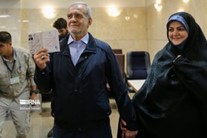Tariq Saeedi
It is not easy to describe a multidimensional person full of determination and optimism in a few words. — Masoud Pezeshkian, the president-elect of Iran is larger than life in every aspect.
During the past few days. I have gone through dozens of stories by the major media outlets and opinion and analysis pieces by the well-known and respected journalists and writers. Sadly, all of them veer off on a tangent as soon as they describe Pezeshkian as a reformist.
The run-of-the-mill stories and tailor-made opinion pieces also present a rather simplistic picture when they divide the entire Iranian landscape into two convenient categories – hardliners and reformists.
In order to envision as to what kind of president would Masoud Pezeshkian be, what would likely be his domestic and foreign policies, and what is the chance of his success, let us start by saying that Masoud Pezeshkian is in a category of his own.
We can come close to understanding Dr. Masoud Pezeshkian when we imagine ourselves in his place at some defining moments in his life. We can ask ourselves whether we would take similar decisions, and have the courage and endurance to stick to our choices?
In 1993, Masoud Pezeshkian lost his wife, Dr. Fatemeh Majidi, a gynaecologist, and their youngest son in a road accident when their car hit a rock in Tabriz province.
It was a sudden and heavy blow for Pezeshkian. A lesser person would have gone into a long period of mourning and self-pity. Not Pezeshkian.
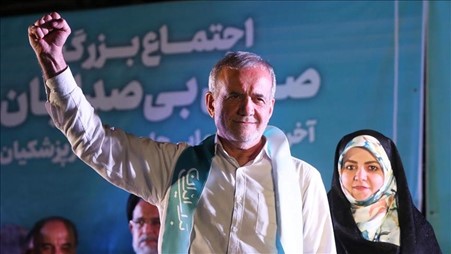 Masoud Pezeshkian with daughter Zahra Majidi-Pezeshkian
Masoud Pezeshkian with daughter Zahra Majidi-Pezeshkian
He decided not to remarry. Instead, he learned how to cook and do everything else for his three remaining children, a daughter and two sons.
In addition to his very busy life as a cardiac surgeon and his administrative responsibilities at the Tabriz University of Medical Sciences in 1994, he went through the entire course books of his children every year to be able to help them do their lessons and serve as their tutor.
In 1993, the year his wife and son passed away, he received a subspecialty in cardiac surgery from Iran University of Medical Sciences. He later became a specialist in heart surgery, leading him to become president of Tabriz University of Medical Sciences in 1994, a position he held for five years.
We can only vaguely imagine the evenings during that period in the life of Masoud Pezeshkian – Planning the meals for next day for his children, supervising their homework, loving them in so many different ways to help them bear the sudden loss of their mother and brother. He did all of this every single day without any break, while attending to the emergencies at the hospital and readying the mind to deal with another hectic day at the hospital.
His decision to devote his life to his children was full of sacrifices but the success of his children today is a proof that he made a tough but right choice:
Zahra Pezeshkian: With a master’s degree in petrochemicals from Sharif University, Zahra was working at Jam Petrochemical Company before the arrival of the Rouhani regime.
Hassan Majidi: Zahra’s husband, Hassan, holds a master’s degree in finance.
Youssef Pezeshkian: The eldest son, Youssef, earned his PhD in physics with a GPA above 17 from Sharif University and is now a faculty member at Sahand University. His wife, Hora, is a graduate student in chemistry.
Mehdi Pezeshkian: Currently completing his PhD thesis in electrical control, Mehdi was abroad on a scholarship but has since returned to Iran. His wife, Fatemeh, has a master’s degree in law, and their son, Mohammed Hossein, is three years old.
His daughter, Zahra Perzeshkian, was his stalwart companion during the presidential campaign.
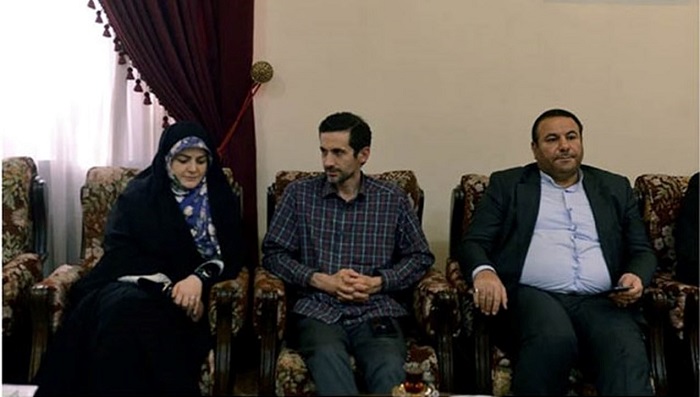 Children of Masoud Pezeshkian – Zahra, Youssef, and Mehdi
Children of Masoud Pezeshkian – Zahra, Youssef, and Mehdi
The shaping of Masoud Pezeshkian actually started when he was sent to the Zabol as a conscript soldier during the time of Shah in 1973. He had just obtained a diploma in agriculture from the school.
Zabol is the outermost district of Iran, bordering with Afghanistan and close to Pakistan.
Amir Timur, in his autobiography, calls the people of Zabol as ‘giants.’ He wanted to recruit the Zabolis in his army but they refused. Apart from the Kurds in the Qochan area of present-day Iran, they were the only people who refused recruitment in the army of Timur.
A young Pezeshkian, seeing the life of the people in Zabol, decided to go to the medical profession instead of agriculture. It was a hard decision because it required many years of disciplined work without a gainful employment. Instead, a career in agriculture would have put him on a quick path to employment and business.
He had just graduated from the medical school in general medicine when the Iran-Iraq war (1980-1988) started. He served during the war at the front lines as a fighter and a doctor. Part of his job was to send the well-prepared medical teams to the spots where they were needed.
His talent for high level multitasking was always at work. While working as the fighter and doctor in the war, he managed to complete his general practitioner course in 1985, and started teaching Physiology at the medical college.
Pezeshkian’s political career began when he joined President Mohammad Khatami’s administration as Deputy Health Minister in 1997. He was appointed Health Minister four years later, serving from 2001 to 2005. Since then, he has been elected to the Iranian parliament five times, representing Tabriz, and served as the First Deputy Speaker of the parliament from 2016 to 2020.
Official website of Masoud Pezeshkian
https://www.drpezeshkian.ir/
He ran in the 2013 presidential election, but withdrew. He ran again in the 2021 election, but was rejected.
Pezeshkian is of mixed parentage. His father was an ethnic Azeri and his mother was Kurdish.
In addition to Farsi, he speaks Arabic, English, Azeri and Kurdish.
There is no allegation of corruption against Masoud Pezeshkian and his family.
* * *
Now, we would try to look at the possible directions of his domestic and foreign policy and the prospects of their success.
It is true that the ultimate authority rests with the Supreme Leader Ayatollah Khamenei. However, the system provides ample scope for the president to implement their policies, particularly in the economic sphere.
As far as the regional political and economic relations are concerned, Pezeshkian administration is expected to continue with the initiatives launched by late president Raisi. This includes wider and deeper engagement with Greater Central Asia in all areas of economy, particularly connectivity and energy,
There would be the genuine effort to revive the Joint Comprehensive Plan of Action (JCPOA) of 2015. Generally called the ‘nuclear deal,’ it was a pivotal step for Iran and the world. However, it was damaged seriously by the abrupt withdrawal of the USA during the presidency of Trump in 2018.
Perhaps the desire to salvage the nuclear deal was one of the reasons why Pezeshkian took Javad Zarif in his campaign team.
Javad Zarif was the foreign minister of Iran from 2013 until 2021 in the government of Hassan Rouhani. During his tenure as foreign minister, he led the Iranian negotiation with P5+1 countries which produced the Joint Comprehensive Plan of Action (JCPOA) on 14 July 2015, lifting the economic sanctions against Iran on 16 January 2016.
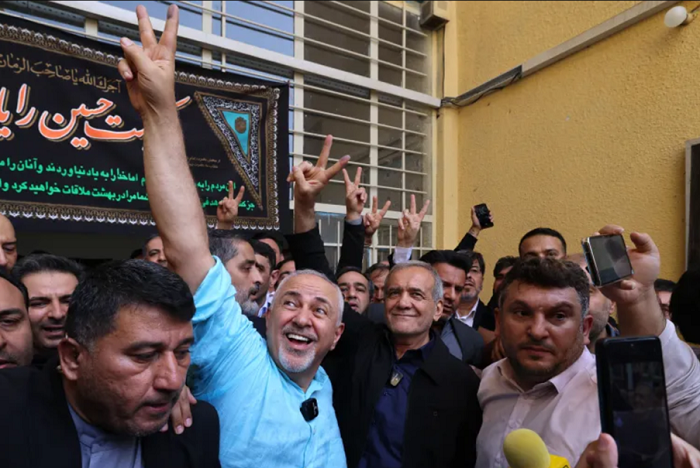 Masoud Pezeshkian and Javad Zarif – announcement of victory
Masoud Pezeshkian and Javad Zarif – announcement of victory
Javad Zarif is a career diplomat. He has an MA in international relations from the San Francisco State University and an MA and a Ph.D. from the Josef Korbel School of International Studies, University of Denver.
Pezeshkian has said that he would consult the experts wherever required. It seems that Javad Zarif could be among the candidates for running the foreign office in Pezeshkian administration.
Pezeshkian has also said that Iran would need about USD 200 billion of annual investments to reach the target of 6% of GDP growth. This could simultaneously be easy and difficult. If his administration focuses on the projects where the investments from China, Russia, Türkiye, and the Arab World could be absorbed with mutual profitability, it would be achievable.
In the area of legislation, Pezeshkian would need to find the common language with just one man: Bagher Ghalibaf, the speaker of the parliament.
Ghalibaf was among the six candidates who ran in the first round of the current presidential elections. He was out of the race because he was not among the two top candidates in the voter count. In the second round, Ghalibaf expressed the support for the opponent of Pezeshkian, Saeed Jalili.
Ghalibaf is also of mixed parentage. His father was Kurdish and his mother was Fars.
He has had an impressive career.
He holds a master’s degree in geography and a Ph.D. in political geography.
He is a certified Airbus pilot.
Ghalibaf served as the chief of the Iranian air force for four years. He has served as the chief of the Iranian Police Force from 1999 to 2005.
He was the mayor of Tehran for three consecutive terms starting in 2005.
He is a professor at the Tehran University.
Ghalibaf was a candidate in the presidential elections of 2013 but lost to Rouhani. He was also a candidate in 2005. In the elections of 2017, he was a candidate but withdrew in favour of Raisi.
The conservatives have the majority in the current parliament of Iran, of which Ghalibaf is the speaker.
Even though Ghalibaf is considered a hardliner, it should be possible for Pezeshkian to build an excellent working relationship with him because both of them support the basic principles of the system and both of them believe in finding the space for manoeuvring within the system.
Economy is the area where the challenges of the domestic and foreign policy mix riotously. The clergy and the parliament are surely mindful of the need to heal the wounds of the society and find ways to create the economic relief for the population.
No matter who the people voted for, it is now the responsibility of President-elect Masoud Pezeshkian to take everyone together.
The urgent questions apart from the state of economy are easily solvable with a logical reinterpretation of some rules related to the dress and conduct code. With the requisite political will, it can be done easily by providing the updated guidelines to the Morality Police.
In parallel development, Keir Starmer and his Labout Party are in power in the UK. This creates a thin but credible sliver of space for Pezeshkian to do some repair to the foreign relations of Iran. This would be incremental.
On the other hand, if Trump returns to the White House, the things would go under another layer of uncertainty.
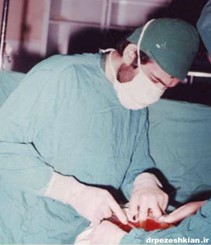 Dr. Pezeshkian performing surgery
Dr. Pezeshkian performing surgery
The world, on the whole, is tired. There is the sense of fatigue. In several situations, it is just the stalemate. Everyone is looking for a way to move on.
However, we know that Pezeshkian is an accomplished cardiac surgeon and he brings that patience, precision, and sense of responsibility to the office of the president of Iran. /// nCa, 8 July 2024 [pictures credit IRNA, AFP, Reuters, GoftarNews]
